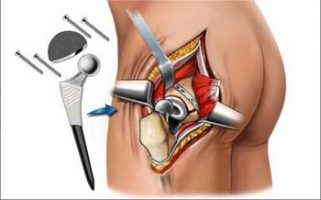- Home
- Editorial
- News
- Practice Guidelines
- Anesthesiology Guidelines
- Cancer Guidelines
- Cardiac Sciences Guidelines
- Critical Care Guidelines
- Dentistry Guidelines
- Dermatology Guidelines
- Diabetes and Endo Guidelines
- Diagnostics Guidelines
- ENT Guidelines
- Featured Practice Guidelines
- Gastroenterology Guidelines
- Geriatrics Guidelines
- Medicine Guidelines
- Nephrology Guidelines
- Neurosciences Guidelines
- Obs and Gynae Guidelines
- Ophthalmology Guidelines
- Orthopaedics Guidelines
- Paediatrics Guidelines
- Psychiatry Guidelines
- Pulmonology Guidelines
- Radiology Guidelines
- Surgery Guidelines
- Urology Guidelines
Hip replacement surgery improves quality of life and also life expectancy

Dr.Peter Cnudde, of the Swedish Hip Arthroplasty Register, Gothenburg, and colleagues conducted a study and have found out that Hip replacement surgery not only improves quality of life but is also associated with increased life expectancy, compared to people of similar age and sex.The study has been reported in Clinical Orthopaedics and Related Research® (CORR®).
Through a decade after surgery, patients undergoing elective total hip arthroplasty (THA) have a slightly improved survival rate compared to the general population, according to the study by Dr. Cnudde comments, "Our study suggests that hip replacement can add years to life as well as adding 'life to years'--increasing the chances of longer survival as well as improving the quality of life."
Through Ten Years, Higher Survival in Patients Undergoing Hip Arthroplasty
The researchers analyzed postoperative survival rate in nearly 132,000 patients undergoing THA in Sweden from 1999 through 2012. Average age at hip replacement was about 68 years. During a median follow-up of 5.6 years, about 16.5 percent of patients died.
Survival after THA was longer than expected, compared to people of similar age and sex in the Swedish general population. In the first year, survival was one percent better in THA patients versus the matched population.
The difference increased to three percent at five years, then decreased to two percent at 10 years. By 12 years, survival was no longer different for THA patients compared to the general population.
The survival difference was significant mainly among patients diagnosed with primary osteoarthritis. This condition, reflecting age-related "wear and tear," accounted for 91 percent of patients undergoing THA. In patients with certain other diagnoses--including osteonecrosis, inflammatory arthritis, and "secondary" osteoarthritis due to other health conditions or risk factors--survival after THA was lower compared to the general population.
Not surprisingly, patients with more accompanying medical conditions (comorbidity) had lower survival after THA. Lower education and single marital status were also associated with lower survival.
Total hip arthroplasty has a proven track record in increasing mobility, reducing pain, and improving quality of life in people with hip pain and dysfunction. The researchers note "strong indications" that patients' survival after THA is improving, and that patients undergoing THA tend to live longer than a matched general population. The new findings support that impression, showing a small but significant improvement in expected survival in patients undergoing THA.
"The reasons for the increase in relative survival are unknown but are probably multifactorial," the researchers write. They note some important limitations of their registry study, including the fact that that only patients in relatively good health are selected for THA.
"While no surgeon would recommend THA to the patients just to live longer, but it is likely that the chances of surviving longer are associated with undergoing the successful operation, for patients in need of a hip replacement," says Dr. Cnudde. He notes that this could be proven only by a randomized controlled trial--which would be impossible to perform for ethical reasons. "So data gathered by registers as part of a well-conducted observational study can provide these answers, in our opinion."
The study provides new insights into the lifelong health benefits and economic value of THA, according to an accompanying CORR Insights® article by Hannes A. Rüdiger, MD, of Schulthess Clinic, Zurich. Especially as the procedure is performed in younger patients, information on the long-term rates of repeat (revision) surgery will be essential. Dr. Rüdiger writes, "As surgeons, we need more data in order to advise a patient about what one can and cannot expect from an intervention and how it will affect them for the rest of their lives."

Disclaimer: This site is primarily intended for healthcare professionals. Any content/information on this website does not replace the advice of medical and/or health professionals and should not be construed as medical/diagnostic advice/endorsement or prescription. Use of this site is subject to our terms of use, privacy policy, advertisement policy. © 2020 Minerva Medical Treatment Pvt Ltd